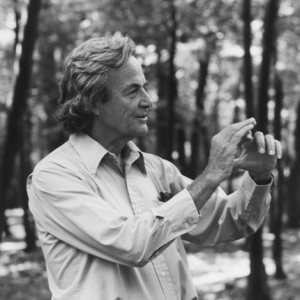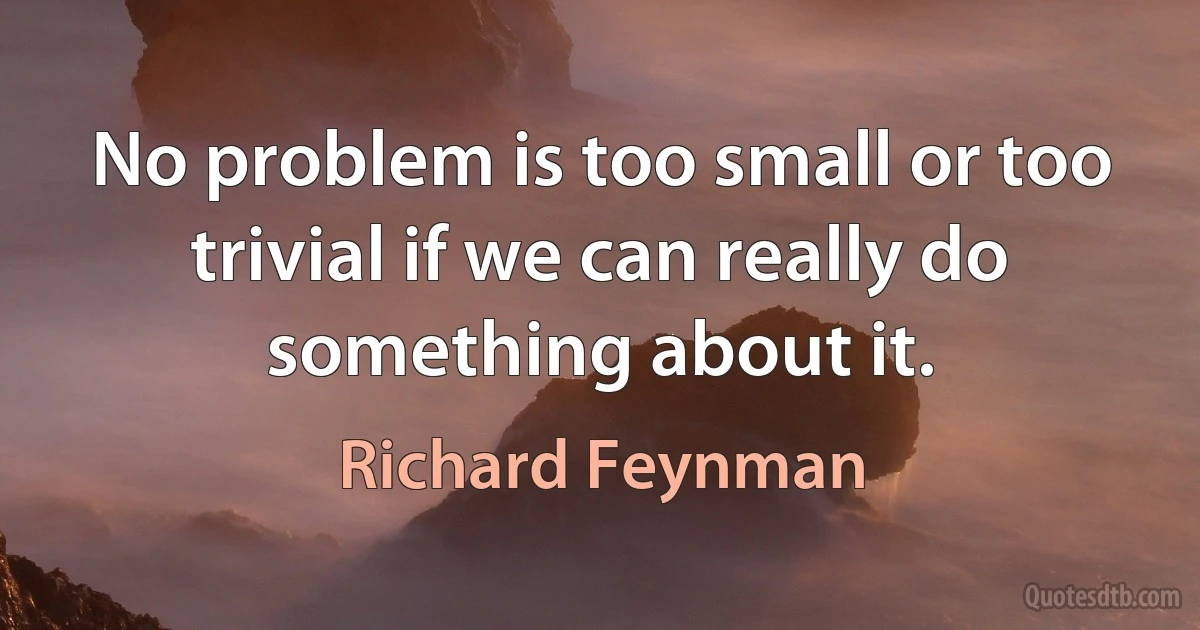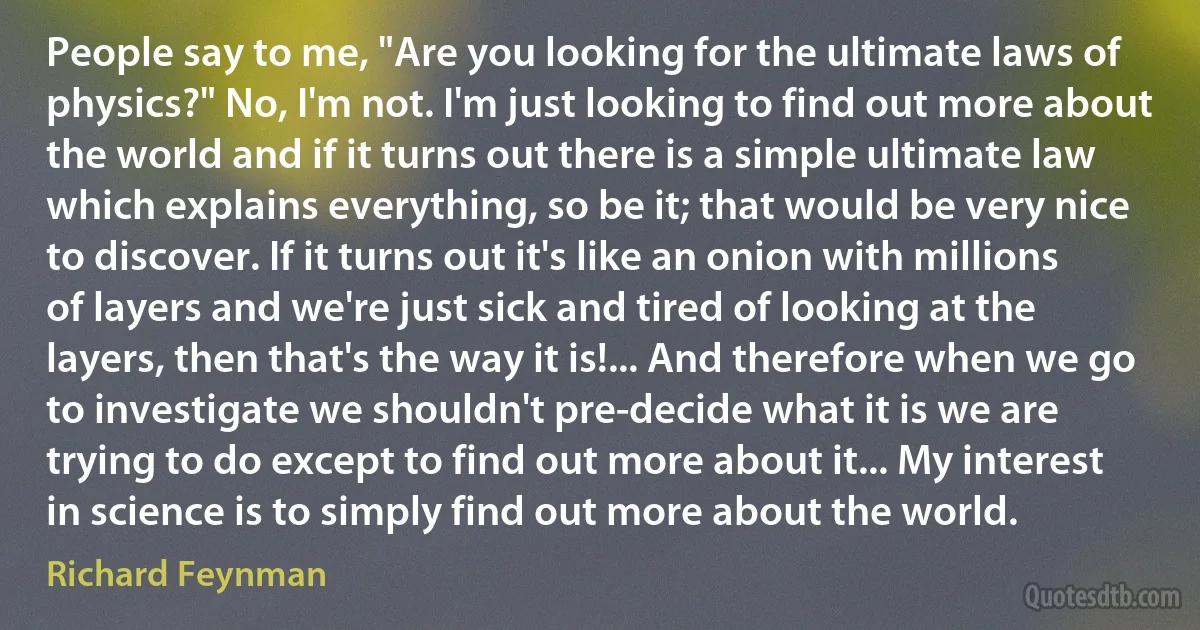Richard Feynman quotes - page 9
Richard Feynman was an American theoretical physicist renowned for his work in quantum mechanics and quantum electrodynamics. His unique teaching style and infectious curiosity inspired generations of scientists and students. He became famous for his Feynman diagrams and for making science accessible to the public. Here are 220 of his quotes:
We've learned from experience that the truth will out. Other experimenters will repeat your experiment and find out whether you were wrong or right. Nature's phenomena will agree or they'll disagree with your theory. And, although you may gain some temporary fame and excitement, you will not gain a good reputation as a scientist if you haven't tried to be very careful in this kind of work. And it's this type of integrity, this kind of care not to fool yourself, that is missing to a large extent in much of the research in Cargo Cult Science.

Richard Feynman
All right. I already see you turning off. I can see you say you don't understand me. You can't understand that it could be chance. "I don't like it!" Tough! I don't like it either, but that's the way it is! OK? I don't understand it either. ..."It must be that Nature knows that it's going to go up or down." No, it must not be that nature knows! We are not to tell Nature what she's gotta be! That's what we found out. Every time we take a guess as how she's got to be, and go and measure... She's clever. She's always got better imagination than we have, and she finds a cleverer way to do it than we have thought of. And in this particular case, the clever way to do it is by probability, by odds. ...[L]ight works by probability.

Richard Feynman
Immediately you would like to know where this number for a coupling comes from: is it related to pi, or perhaps to the base of natural logarithms? Nobody knows. It's one of the greatest damn mysteries of physics: a magic number that comes to us with no understanding by man. You might say the "hand of God" wrote that number, and "we don't know how He pushed His pencil." We know what kind of a dance to do experimentally to measure this number very accurately, but we don't know what kind of dance to do on the computer to make this number come out - without putting it in secretly!

Richard Feynman
I wanted very much to learn to draw, for a reason that I kept to myself: I wanted to convey an emotion I have about the beauty of the world. It's difficult to describe because it's an emotion. It's analogous to the feeling one has in religion that has to do with a god that controls everything in the whole universe: there's a generality aspect that you feel when you think about how things that appear so different and behave so differently are all run "behind the scenes" by the same organization, the same physical laws. It's an appreciation of the mathematical beauty of nature, of how she works inside; a realization that the phenomena we see result from the complexity of the inner workings between atoms; a feeling of how dramatic and wonderful it is. It's a feeling of awe - of scientific awe - which I felt could be communicated through a drawing to someone who had also had this emotion. It could remind him, for a moment, of this feeling about the glories of the universe.

Richard Feynman
Feynman uses Dirac's notation to describe the quantum mechanics of stimulated emission. ... He applies that physics to several physical systems, including dye molecules. ... In this regard, Feynman could have predicted the existence of the tunable laser. Furthermore, Feynman made accessible Dirac's quantum notation via his thought experiments on two-slit interference with electrons.

Richard Feynman
Feynman has no interest in scholastic arguments. He is concerned only with human problems. He has a deep respect for religion, because he sees it as helping people to behave well toward one another and to be brave in facing tragedy. He respects religion as an important part of human nature. He does not himself believe in God, but he has no wish to destroy other people's belief.

Richard Feynman
Architect of quantum theories, brash young group leader on the atomic bomb project, inventor of the ubiquitous Feynman diagram, ebullient bongo player and storyteller, Richard Phillips Feynman was the most brilliant, iconoclastic, and influential physicist of modern times. He took the half-made conceptions of waves and particles in the 1940s and shaped them into tools that ordinary physicists could use and understand. He had a lightning ability to see into the heart of the problems nature posed.

Richard Feynman
Several conversations that Feynman and I had involved the remarkable abilities of other physicists. In one of these conversations, I remarked to Feynman that I was impressed by Stephen Hawking's ability to do path integration in his head. "Ahh, that's not so great", Feynman replied. "It's much more interesting to come up with the technique like I did, rather than to be able to do the mechanics in your head." Feynman wasn't being immodest, he was quite right. The true secret to genius is in creativity, not in technical mechanics.

Richard Feynman
As soon as I arrived at Cornell, I became aware of Dick as the liveliest personality in our department. In many ways he reminded me of Frank Thompson. Dick was no poet and certainly no Communist. But he was like Frank in his loud voice, his quick mind, his intense interest in all kinds of things and people, his crazy jokes, and his disrespect for authority. I had a room in a student dormitory and sometimes around two o'clock in the morning I would wake up to the sound of a strange rhythm pulsating over the silent campus. That was Dick playing his bongo drums. Dick was also a profoundly original scientist. He refused to take anybody's word for anything. This meant that he was forced to rediscover or reinvent for himself almost the whole of physics. It took him five years of concentrated work to reinvent quantum mechanics. He said that he couldn't understand the official version of quantum mechanics that was taught in textbooks, and so he had to begin afresh from the beginning.

Richard Feynman
Richard Feynman
 Occupation: American Physicist
Occupation: American Physicist
Born: May 11, 1918
Died: February 15, 1988
Quotes count: 220
Wikipedia: Richard Feynman











